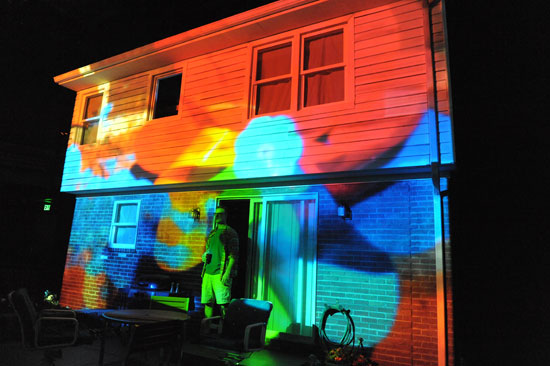REVIEW: Woolly Mammoth’s ‘Detroit’ brings economic crash into sharp focus.
During the post-World War II years of rapid growth, Detroit, the Motor City, was a bustling center of employment and development. It lived up to the cynical motto expressed by the former head of General Motors that what was good for General Motors was good for the country. And it was good.
In Detroit and across the nation there was a mad dash to build suburban homes with lawns and garages in a dizzying array of cul-de-sac communities where many of the houses were duplicates of the one across the street. It increased the demand for cars to get back and forth to work and home and the automotive industry, headquartered in the region, was booming. Detroit represented the golden American economy and contributed to the manifestation of what was seen as the “American Dream.” With the automotive industry dominating the economy, there arose a dogma that it was all part of an unending prosperity for Detroit and the country.
But like all dreams, there comes the awakening of reality and that uncomfortable reality is the core of Lisa D’Amour’s play, “Detroit,” now at the Woolly Mammoth Theatre. The city of Detroit becomes the metaphor for the economic crisis of a failing automotive industry and a failing city. In July of this year, Detroit filed the largest municipal bankruptcy in U.
S. history.
D’Amour’s Detroit doesn’t deal with the grave macroeconomic issues of the shriveling city. Instead the focus is on one of the once glittering middle-class suburbs. She focuses even tighter and takes us into the backyards of two of those homes: one owned by a conventional middle-class couple with a neat lawn and the requisite lawn furniture and barbecue; the other owned by a couple just back from drug rehabilitation and living in an unkempt abandoned, rundown house with none of the usual amenities.
Woolly director John Vreeke and set designer Tom Kamm create an intimate setting by reconfiguring the set across the middle of the theater with the audience seated on both sides. It has the effect of a voyeuristic look into the abutting two backyards.
The audience becomes neighbors with an unobstructed view of what’s going on next door.
Vreeke allows us to watch the two incompatible couples move toward what will inevitably be a clash. The conventional couple, Ben and Mary (Tim Getman and Emily K. Townley), is struggling since Ben lost his job at a bank. He is unfocused and supposedly trying to design an Internet investment idea.
The other couple, Kenny and Sharon (Danny Gavigan and Gabriela Fernandez-Coffee), are both unemployed and living like squatters across the yard.
As dissimilar as the two couples are, there is a grim reality in that they are unwitting players in the spiraling fall of a once sought-after suburban lifestyle that is not so desirable anymore. Getman, Townley, Gavin and Fernandez-Coffee are so effective in their roles that the voyeuristic experience of watching the developing disaster is often painful.
After a conflagration and collapse of the fragile friendships between the two couples has settled, Michael Willis, a familiar figure in other Woolly productions comes out to talk about what the suburb was like when it was new and populated with young families, when he had lived in the neighborhood. He talks warmly about the five different house styles and the friendly people.
All of that is gone as Vreeke emphasizes in the early minutes of the play, before the actors come on stage, with ghostly images of family life projected onto the back walls of the two houses. It is a reminder when it was a special, more innocent place to live and raise a family.
And now, like much of Detroit, it is filled with abandoned houses and fading dreams.
“Detroit” runs through Oct. 6 at Woolly Mammoth Theatre, 641 D St. NW. Tickets are $35 and available at 202-393-3939 and online here.

